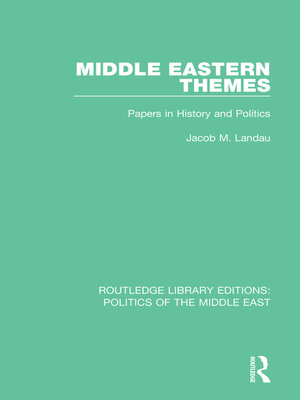Middle Eastern Themes
ebook ∣ Papers in History and Politics · Routledge Library Editions: Politics of the Middle East
By Jacob M. Landau

Sign up to save your library
With an OverDrive account, you can save your favorite libraries for at-a-glance information about availability. Find out more about OverDrive accounts.
Find this title in Libby, the library reading app by OverDrive.



Search for a digital library with this title
Title found at these libraries:
| Library Name | Distance |
|---|---|
| Loading... |
This volume, first published in 1973, brings together a wide range of Professor Landau's work on recent Middle Eastern history and politics, reflecting the breadth of the author's concern and research. The first section deals with aspects of political organisation in the Middle East, largely Egypt, towards the end of the nineteenth century. A little-known plan of the Islamic reformer al-Afghani is discussed, showing him in a rather more political light than the religious haze which normally surrounds this pan-Islamic campaigner. The role of the influential secret societies in modern Egypt is outlined, and the politics behind the fluctuations in the degree of responsibility allowed to Egyptian ministers is examined. This section is concluded by a chapter on two proposals for the establishment of a Jewish homeland in the Sudan in the early days of Zionism, throwing interesting light on the differing aims of early Zionists and alternative historical paths that might have been taken. The second section of the book contains studies on the Jewish situation in nineteenth-century Egypt, focusing on their position within the larger Muslim society and on socio-economic factors, as well as on the career of James Sanua ('Abu Naddara'), an Egyptian Jew who played a prominent part in nationalist agitation. The two final parts of the book turn to recent and contemporary electoral politics in the Middle East, with special attention being paid to the political leadership and voting behaviour of the Arabs in Israel. Other studies deal with elections in Lebanon and Turkey, and the final chapter analyses the militant right-wing elements in the Turkish political spectrum.







